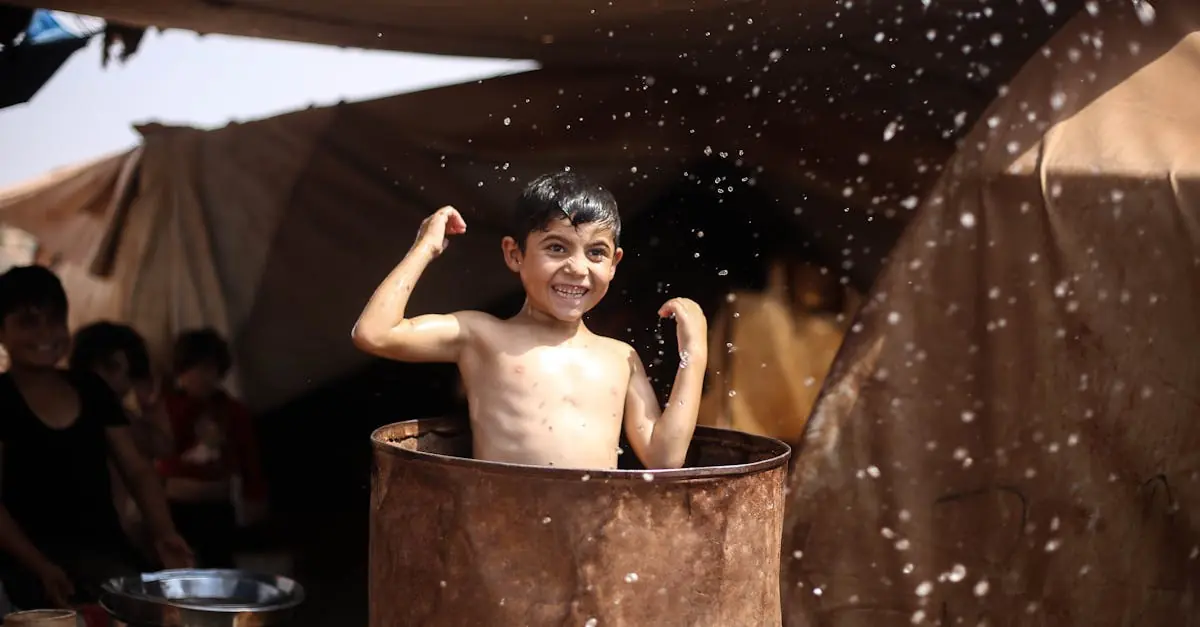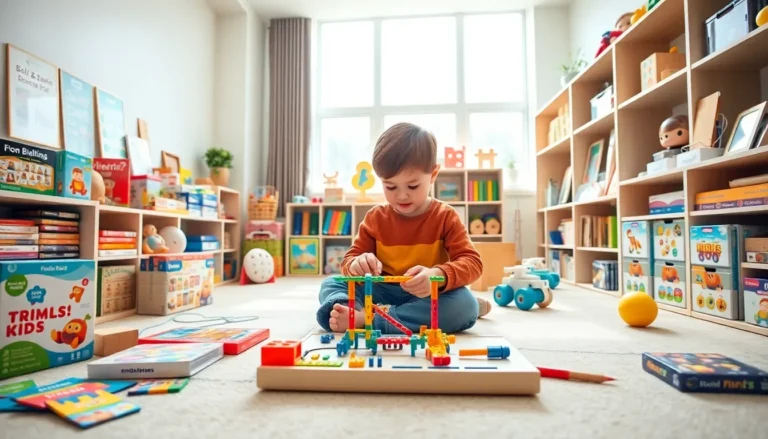Summer camp isn’t just for roasting marshmallows and perfecting the art of the cannonball. For autistic kids, it’s a golden opportunity to dive into social skills, make friends, and explore new activities in a supportive environment. Imagine a place where every splash in the pool and every game of tag is tailored to help them shine.
Table of Contents
ToggleOverview of Summer Camp for Autistic Kids
Summer camps designed for autistic kids provide unique opportunities for growth. These camps focus on fostering social skills in a structured environment. Engagement in activities like swimming, arts and crafts, and group games occurs regularly, promoting interaction among peers.
Program staff possess specialized training in supporting children with autism. Medical professionals often oversee health and safety protocols during activities. Schedules may include quiet time, allowing kids to recharge in calmer settings.
Families find these camps beneficial as they create a sense of belonging. Often, children develop new friendships that extend beyond the camp experience. Parents frequently report increased confidence in their kids after attending such camps.
Some camps tailor their programs to various age groups, ensuring age-appropriate activities engage participants. Others focus on specific interests, such as nature, technology, or sports. This diversity accommodates different needs and preferences, enhancing the overall camp experience.
Feedback from parents emphasizes positive transformations. Many kids express excitement about returning each summer. By creating a safe, nurturing setting, summer camps for autistic children promote personal growth, exploration, and social connections.
Benefits of Summer Camp for Autistic Kids
Summer camp offers numerous benefits for autistic children, fostering their development in various areas. Participants engage in enriching experiences tailored to their needs.
Social Skills Development
Summer camp facilitates social skills development in a structured, supportive environment. Engaging in group activities allows children to practice communication and teamwork. They learn to navigate social interactions through structured play and collaborative projects. Development of turn-taking and sharing skills occurs naturally during games. Regular participation in group settings encourages forming friendships. Such connections enhance peer relationships and improve social confidence.
Emotional Growth
Camps provide healthy emotional growth through unique experiences. Autistic children often explore new activities and face varied challenges, fostering resilience. Opportunities for self-expression arise through arts and crafts or drama, contributing to emotional understanding. Quiet time allows for personal reflection, helping them manage sensory overload. Developing coping strategies in a safe space promotes emotional regulation. As they return each summer, many kids demonstrate increased self-esteem and emotional well-being, showcasing significant progress in their personal development.
Types of Summer Camps Available
Various types of summer camps cater to autistic children, each offering unique experiences that promote growth and development.
Traditional Camps
Traditional summer camps typically focus on outdoor activities such as swimming, hiking, and crafts. Many of these camps provide a supportive environment, encouraging social interaction among campers. Staff members often receive training to address the specific needs of autistic children. Activities designed for group participation help kids practice teamwork skills while having fun. Children engaged in traditional camps often report a sense of belonging, leading to the formation of lasting friendships. Some traditional camps might present challenges, ensuring that adequate support is available to help all campers thrive.
Specialized Autism Camps
Specialized autism camps cater directly to the unique needs of autistic children. These camps feature tailored programs that focus on social skills, communication, and sensory integration. Each camp typically employs staff with expertise in autism spectrum disorder, ensuring a comprehensive support system. Activities may include structured social skills training, art therapy, and sensory-friendly environments. Many specialized camps offer smaller group sizes to facilitate individual attention, promoting confidence and comfort. Children attending these camps often experience significant personal growth and develop essential life skills applicable beyond the camp experience.
Choosing the Right Summer Camp
Selecting an appropriate summer camp for autistic children requires careful consideration of various factors. Identifying a camp that aligns with a child’s unique needs enhances their experience and fosters growth.
Assessing Individual Needs
Parents should evaluate their child’s specific strengths and challenges. Understanding sensory sensitivities plays a crucial role in selecting appropriate activities. Additionally, identifying social skill levels can guide the choice between traditional and specialized camps. Some children thrive in larger groups, while others benefit from smaller settings that offer individualized attention. Gathering feedback from educators or therapists may provide valuable insights into a child’s preferences. Ultimately, assessing these individual needs ensures a year of positive experiences.
Camp Environment and Staff Qualifications
Environment matters significantly in summer camp settings. Parents must look for camps with structured routines that align with their child’s preferences. Assessing staff qualifications is essential, as trained personnel promote a supportive atmosphere. Staff members should possess experience working with autistic children and understand their unique needs. Maintaining a low staff-to-child ratio encourages close interactions and personalized support. Camps with ongoing training in autism spectrum disorder provide children with a safer, more nurturing space. Prioritizing these factors enhances each child’s camp experience.
Summer camp for autistic kids offers an invaluable experience that fosters personal growth and social development. With tailored programs and trained staff, these camps create safe spaces where children can explore new activities and build lasting friendships. Parents often notice remarkable improvements in their child’s confidence and emotional well-being, reinforcing the positive impact of such experiences. By carefully selecting the right camp, families can ensure their children thrive in an environment that meets their unique needs. Ultimately, summer camp serves as a stepping stone for autistic children to enhance their life skills and enjoy a fulfilling summer filled with joy and connection.





